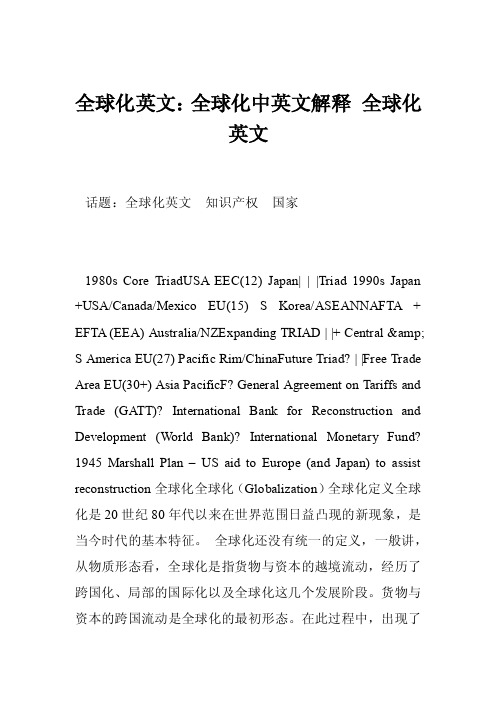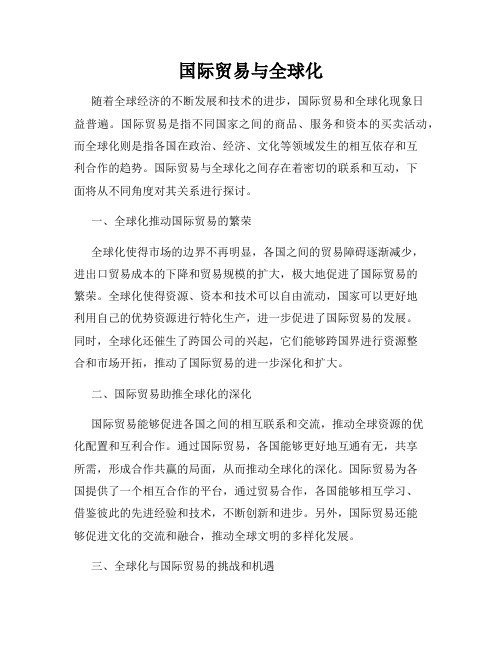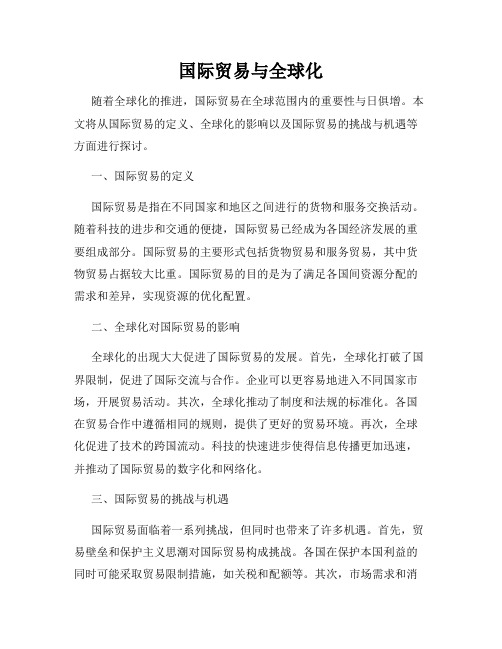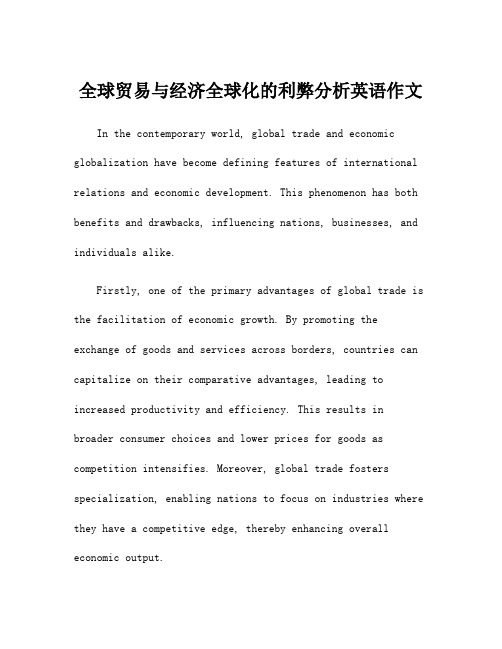全球化与国际贸易(附带英文)
全球化英文:全球化中英文解释全球化英文

全球化英文:全球化中英文解释全球化英文话题:全球化英文知识产权国家1980s Core TriadUSA EEC(12) Japan| | |Triad 1990s Japan +USA/Canada/Mexico EU(15) S Korea/ASEANNAFTA + EFTA (EEA) Australia/NZExpanding TRIAD | |+ Central & S America EU(27) Pacific Rim/ChinaFuture Triad? | |Free Trade Area EU(30+) Asia PacificF? General Agreement on Tariffs and Trade (GATT)? International Bank for Reconstruction and Development (W orld Bank)? International Monetary Fund? 1945 Marshall Plan –US aid to Europe (and Japan) to assist reconstruction全球化全球化(Globalization)全球化定义全球化是20世纪80年代以来在世界范围日益凸现的新现象,是当今时代的基本特征。
全球化还没有统一的定义,一般讲,从物质形态看,全球化是指货物与资本的越境流动,经历了跨国化、局部的国际化以及全球化这几个发展阶段。
货物与资本的跨国流动是全球化的最初形态。
在此过程中,出现了相应的地区性、国际性的经济管理组织与经济实体,以及文化、生活方式、价值观念、意识形态等精神力量的跨国交流、碰撞、冲突与融合。
总的来看,全球化是一个以经济全球化为核心、包含各国各民族各地区在政治、文化、科技、军事、安全、意识形态、生活方式、价值观念等多层次、多领域的相互联系、影响、制约的多元概念。
供应链中的全球化与国际贸易

供应链中的全球化与国际贸易(正文)供应链是指为满足客户需求而组织和管理一系列的物流活动和流程的网络。
全球化和国际贸易的兴起对供应链产生了深远的影响。
本文将探讨供应链中的全球化与国际贸易之间的关系,以及其对企业和全球经济的影响。
1. 全球化对供应链的影响全球化使得跨国公司的数量不断增加,各国之间的商业往来日益频繁。
这导致了供应链的全球化趋势。
随着供应链的全球化,企业可以从全球范围内寻找最优质、最具竞争力的原材料和产品。
此外,全球化还使得企业能够将生产和销售环节分散到不同的国家,以降低成本并获得更大的市场份额。
2. 国际贸易对供应链的影响国际贸易作为供应链的重要组成部分,直接影响着供应链的运作效率和质量。
国际贸易为企业提供了更广阔的市场,使得企业可以将产品和服务销售到更多的国家和地区。
同时,国际贸易也为企业提供了更多的供应商选择和合作伙伴,增加了供应链的灵活性和多样性。
通过国际贸易,企业可以获得更多的资源和技术,提高产品质量和创新能力。
3. 全球化对国际贸易的影响全球化加速了国际贸易的发展。
随着交通和通信技术的进步,国际贸易的障碍逐渐减少,贸易规模不断扩大。
全球化使得市场竞争更加激烈,企业需要不断提高竞争力,才能在全球市场中生存和发展。
在全球化的背景下,国际贸易成为企业走向世界的重要途径,也为国家的经济发展提供了巨大的机遇。
4. 国际贸易对全球经济的影响国际贸易是全球经济增长的重要推动力量。
国际贸易使得各国可以通过相互之间的优势互补,实现资源的有效配置和合作发展。
通过国际贸易,企业可以获得更多的市场份额,实现规模经济效应,推动经济的增长和就业的增加。
同时,国际贸易也加强了各国之间的联系和合作,促进了全球经济的繁荣和稳定。
总结:供应链中的全球化与国际贸易密不可分,它们相互促进和支持着彼此的发展。
全球化使得供应链越来越国际化,企业可以利用全球资源和市场来提升竞争力。
国际贸易则为供应链提供了更广阔的市场和更多的合作伙伴选择。
国际贸易与全球化

国际贸易与全球化随着全球经济的不断发展和技术的进步,国际贸易和全球化现象日益普遍。
国际贸易是指不同国家之间的商品、服务和资本的买卖活动,而全球化则是指各国在政治、经济、文化等领域发生的相互依存和互利合作的趋势。
国际贸易与全球化之间存在着密切的联系和互动,下面将从不同角度对其关系进行探讨。
一、全球化推动国际贸易的繁荣全球化使得市场的边界不再明显,各国之间的贸易障碍逐渐减少,进出口贸易成本的下降和贸易规模的扩大,极大地促进了国际贸易的繁荣。
全球化使得资源、资本和技术可以自由流动,国家可以更好地利用自己的优势资源进行特化生产,进一步促进了国际贸易的发展。
同时,全球化还催生了跨国公司的兴起,它们能够跨国界进行资源整合和市场开拓,推动了国际贸易的进一步深化和扩大。
二、国际贸易助推全球化的深化国际贸易能够促进各国之间的相互联系和交流,推动全球资源的优化配置和互利合作。
通过国际贸易,各国能够更好地互通有无,共享所需,形成合作共赢的局面,从而推动全球化的深化。
国际贸易为各国提供了一个相互合作的平台,通过贸易合作,各国能够相互学习、借鉴彼此的先进经验和技术,不断创新和进步。
另外,国际贸易还能够促进文化的交流和融合,推动全球文明的多样化发展。
三、全球化与国际贸易的挑战和机遇在全球化和国际贸易的背景下,各国面临着机遇和挑战。
一方面,国际贸易的繁荣为各国提供了发展经济、增加就业机会和提升人民生活水平的机遇。
另一方面,国际贸易也带来了一些挑战,如贸易壁垒、知识产权保护和贸易摩擦等。
全球化的进程也使得一些国家和地区面临着资源失衡的问题和经济结构调整的挑战。
然而,这种挑战也可以被看作是机遇,通过改革开放和国际贸易的积极参与,各国可以更好地应对挑战和解决问题,实现经济的可持续发展。
总结起来,国际贸易与全球化是相互促进和依存的。
国际贸易的繁荣和深化有助于推动全球化的进程,而全球化的深化又为国际贸易提供了更广阔的发展空间和市场机会。
国际贸易与全球化

国际贸易与全球化随着全球化的推进,国际贸易在全球范围内的重要性与日俱增。
本文将从国际贸易的定义、全球化的影响以及国际贸易的挑战与机遇等方面进行探讨。
一、国际贸易的定义国际贸易是指在不同国家和地区之间进行的货物和服务交换活动。
随着科技的进步和交通的便捷,国际贸易已经成为各国经济发展的重要组成部分。
国际贸易的主要形式包括货物贸易和服务贸易,其中货物贸易占据较大比重。
国际贸易的目的是为了满足各国间资源分配的需求和差异,实现资源的优化配置。
二、全球化对国际贸易的影响全球化的出现大大促进了国际贸易的发展。
首先,全球化打破了国界限制,促进了国际交流与合作。
企业可以更容易地进入不同国家市场,开展贸易活动。
其次,全球化推动了制度和法规的标准化。
各国在贸易合作中遵循相同的规则,提供了更好的贸易环境。
再次,全球化促进了技术的跨国流动。
科技的快速进步使得信息传播更加迅速,并推动了国际贸易的数字化和网络化。
三、国际贸易的挑战与机遇国际贸易面临着一系列挑战,但同时也带来了许多机遇。
首先,贸易壁垒和保护主义思潮对国际贸易构成挑战。
各国在保护本国利益的同时可能采取贸易限制措施,如关税和配额等。
其次,市场需求和消费习惯的多样化给企业带来了需求的不确定性,需要灵活应对。
此外,国际贸易还面临不稳定的外汇和汇率波动风险,这对企业的国际业务带来了挑战。
然而,国际贸易也提供了广阔的机遇。
首先,打破国界限制使得企业可以在全球范围内寻找更广阔的市场和资源。
第二,国际贸易促进了技术的转移和创新。
通过与不同国家和地区的企业进行交流合作,促进了技术的流动,激发了创新活力。
此外,国际贸易还提供了学习和发展的机会,使企业能够不断提高自身竞争力。
四、结论国际贸易与全球化联系紧密,互为促进与支撑。
全球化推动了国际贸易的发展,而国际贸易也是实现全球化的重要手段之一。
然而,国际贸易面临着诸多挑战,需要各国共同努力,加强合作,解决共同问题。
只有通过合作与交流,才能实现国际贸易的可持续发展,推动全球经济的繁荣与稳定。
地道英语口语学习:Globalisation全球化

地道英语⼝语学习:Globalisation 全球化Helen: This is Real English from BBC Learning English. I’m Helen.Chen Li: And I’m Chen LiHelen: Today let’s put on our business thinking hat and talk business.Chen Li: ok then.在今天的Real English节⽬⾥,让我们来谈论商务,那么今天给⼤家准备的是什么词语呢?Helen: Today’s business magic word is ‘globalisation’.Chen Li: Globalisation.为什么不说说它的中⽂意思呢?Helen: Well, globalisation is often used in business English. You use it to talk about businesses or companies that operate all over the world.Chen Li: 在世界各地经营的公司?Helen: Literally all over the world. Here’s an example. You know McDonald’s the fast food chain.Chen Li: Of course ⼤家都听说过麦当劳Helen: Yes. It is now possible – because of globalisation – to eat McDonalds in almost any country in the world. You can get a big Mac in Moscow, Rio or Sydney.Chen Li: 我知道了. Globalisation 就是全球化,当⼀个企业在全球市场发展时。
全球贸易与经济全球化的利弊分析英语作文

全球贸易与经济全球化的利弊分析英语作文In the contemporary world, global trade and economic globalization have become defining features of international relations and economic development. This phenomenon has both benefits and drawbacks, influencing nations, businesses, and individuals alike.Firstly, one of the primary advantages of global trade is the facilitation of economic growth. By promoting the exchange of goods and services across borders, countries can capitalize on their comparative advantages, leading to increased productivity and efficiency. This results in broader consumer choices and lower prices for goods as competition intensifies. Moreover, global trade fosters specialization, enabling nations to focus on industries where they have a competitive edge, thereby enhancing overall economic output.Furthermore, economic globalization encourages foreign direct investment (FDI), allowing businesses to expand into new markets and diversify their operations. This influx of capital can stimulate local economies, create job opportunities, and transfer technology and knowledge across borders. For developing countries, in particular, FDI can act as a catalyst for industrialization and infrastructure development, propelling them towards economic advancement.On the other hand, economic globalization is not without its challenges and criticisms. One significant concern is the exacerbation of income inequality within and between nations. While global trade can boost national economies, its benefits are often unevenly distributed, with marginalized communities and regions often left behind. This inequality can lead to social unrest and political instability, undermining the potential gains from economic integration.Moreover, economic globalization has been blamed for environmental degradation. The increased movement of goods and services worldwide has escalated carbon emissions and pollution levels, contributing to climate change and biodiversity loss. The pursuit of economic growth at all costs has led to unsustainable resource exploitation and ecological footprint, posing long-term risks to the planet's health and future generations.Another drawback of economic globalization is its potential to undermine national sovereignty. As countries become more interconnected economically, they may face pressure to conform to global trade rules and regulations set by international organizations and agreements. This can limit a nation's ability to enact policies that prioritize domestic interests, such as environmental protection, labor standards, and social welfare.Additionally, global trade can make economies more vulnerable to external shocks and economic downturns. Interdependence among nations means that economic crises in one country can quickly spread to others through trade channels, leading to a synchronized global recession. The 2008 financial crisis and more recent disruptions caused by the COVID-19 pandemic illustrate how interconnectedness can amplify economic instability and uncertainty.In conclusion, while global trade and economic globalization offer substantial benefits in terms of economic growth, efficiency, and international cooperation, they also present significant challenges that must be addressed. Governments, businesses, and international organizations need to strive for more inclusive and sustainable forms of economic integration, ensuring that the benefits of globalization are equitably shared while mitigating its adverse effects on society, the environment, and national sovereignty. Only through thoughtful policy-making and globalcooperation can we harness the full potential of global trade while minimizing its drawbacks in the pursuit of a more prosperous and equitable world.。
国际贸易和经济全球化
国际贸易和经济全球化一、国际贸易概览国际贸易是指不同国家之间的商品和服务交换。
在一个全球化的世界中,国际贸易已成为推动经济增长和繁荣的关键因素。
随着传输和通讯技术的进步,国际贸易已经变得更方便、更快捷和更广泛。
二、贸易自由化贸易自由化是指取消或降低贸易壁垒,以便更自由地进行国际贸易。
最著名的例子是《关税和贸易总协定》(GATT),该协定是贸易自由化的追求者,致力于降低各种贸易壁垒,提高世界贸易的效率。
三、经济全球化经济全球化是指一国与其他国家经济之间的联系和依存程度,也包括跨国公司、资本市场和劳动力市场。
经济全球化旨在加强世界各国之间的经济联系,推动全球经济增长,但也面临着许多挑战和争议。
四、世贸组织世界贸易组织(WTO)是负责监管国际贸易的机构,自1995年建立以来已发挥了重要作用。
WTO的角色是确保世界贸易遵守规则,培养贸易合作,并为发展中国家提供技术援助。
五、贸易自由化的利与弊贸易自由化有许多显著优势,包括提高商品和服务的质量和价格,提高生产力和效率,并为消费者提供更多选择。
同时,贸易自由化也有一些负面影响,例如可能会导致一些工作流失和失业,不同国家之间的收入差距扩大,造成环境问题等。
六、经济全球化的影响经济全球化的好处包括加强国际贸易和劳动力市场以及提供更多的经济机遇和资金流动。
然而,经济全球化也带来了一些负面影响,例如失业增加、文化交流受限和社会不平等加剧等。
七、结论国际贸易是一个既复杂又关键的领域,其对全球经济发展的影响不能被忽视。
通过贸易自由化和经济全球化,各国可以获得更多的经济机遇,但也需要确保所有国家都能从这种贸易中受益。
经济全球化与国际贸易
经济全球化与国际贸易在目前全球化的时代,国际贸易作为国家之间互通有无,交流经验,增进民间交流的重要方式,对各国的经济和社会发展都有很大影响。
全球化的经济史上,贸易是其中最为活跃的领域,贸易也成为了国际关系中重要的一环。
本文将从经济全球化和国际贸易两个方面阐述其特征以及影响。
一、经济全球化经济全球化,通常指的是各国之间在经济领域的全面互动,其中包括贸易、投资、资本自由流动、人力资源流动、技术交流等各个方面。
随着信息技术、贸易自由化进程的不断加速,世界经济已经成为一个越来越紧密的融合体系。
全球化不仅使各国在经济上互相联系,而且在文化、教育、科研等方面也产生了深远的影响。
全球化也导致了“西方化”的趋势,越来越多的国家时尚、消费习惯、社会价值观和语言文化等也受到了影响。
然而,全球化也在某些方面带来一些问题。
随着产业的全球化,职业就业的机会也不再局限于国家和地区之间,而是越来越受到全球化的限制。
产业的转移导致了许多发展中国家劳动力失业。
此外,全球化还存在一些不公正因素,比如贸易保护主义、知识产权协议等,这些限制了很多发展中国家的发展,并导致了资源和财富的不均衡分配。
二、国际贸易国际贸易是指跨越国界进行的商品和服务交换。
它是目前全球化过程中最为重要的一个方面。
国际贸易不仅促进了各国之间的交流,也是促进全球经济发展的重要手段。
国际贸易的特点是多样化、开放性和互惠性。
多样化体现在各种形式的贸易方式,包括进口再出口、跨国公司(TNC)的投资贸易、采购贸易等。
开放性体现在许多国家正在采用更开放的贸易政策,以便对全球市场更加敏感。
最后,互惠性体现在各国之间的贸易是基于相互需要。
在全球化的背景下,国际贸易的影响越来越大,它横跨各个国家的边界,促进了全球经济的发展。
优势互补是国际贸易的一种典型形式。
各国通过国际贸易,充分发挥各自的优势,形成了以贸易互惠为基础的国际经济合作共同体,推动了全球经济发展。
但是,国际贸易也存在一些问题。
全球化与国际贸易
全球化与国际贸易随着现代科技的迅猛发展和信息交流的日益便捷,全球化已成为不可避免的趋势。
全球化带来了国际贸易的蓬勃发展,改变了人们的生活方式和经济结构。
本文将探讨全球化与国际贸易之间的关系,分析其带来的利弊,并展望未来全球化与国际贸易的发展趋势。
一、全球化与国际贸易的紧密联系全球化是指世界范围内的经济、文化、政治等各方面的交流与融合。
国际贸易则是全球化的重要组成部分,是各个国家和地区之间进行物质和服务交换的重要方式。
全球化促进了国际贸易的发展,同时国际贸易也推动了全球化的进程。
首先,全球化加速了国际贸易的速度和规模。
通过科技进步和交通运输的便利化,人们更容易实现跨国界的贸易往来。
国内市场的扩大导致了产品供给的过剩,因此企业需要开拓国际市场来扩大销售范围。
例如,中国以制造业的低成本优势迅速崛起,成为全球贸易的重要角色之一。
其次,国际贸易的发展促进了全球化进程的加速。
不同国家和地区之间的贸易往来迫使各个国家加强合作,致力于建立共同的规则和标准。
国际组织如世界贸易组织(WTO)等应运而生,制定了一系列贸易规则,保障了贸易自由和公平。
二、全球化与国际贸易的利弊全球化与国际贸易带来了许多积极的影响,同时也存在一些负面影响。
首先,全球化和国际贸易为各国经济发展提供了巨大机遇。
通过国际贸易,企业可以扩大市场、降低成本,提高效率和竞争力。
同时,全球化也为各国提供了加强合作、共同发展的平台。
通过分享技术和经验,各国可以实现互利共赢。
然而,全球化和国际贸易也带来了一些挑战和问题。
第一,全球化导致了资源和财富的不平等分配。
发达国家和跨国公司通常能够从全球贸易中受益更多,而发展中国家和小型企业则面临竞争的压力和资源的流失。
第二,全球化增加了对环境的压力。
随着贸易量的增加,产生的碳排放、能源消耗等也会不断增加,对环境造成负面影响。
第三,全球化也带来了文化冲击和失业风险。
传统文化可能受到同化的影响,而一些产业可能因为国际市场的竞争而面临裁员和关闭。
经济全球化与国际贸易
经济全球化与国际贸易随着科技与工业的不断进步,全球化越来越成为一个不可回避的现实。
经济全球化作为其中最突出的现象之一,已经深入到人类社会的每一个角落。
随着全球多边贸易机制的建立和逐步完善,国际贸易成为全球经济最为活跃的领域之一。
经济全球化的意义在于将各国和地区的经济系统整合在一起,通过无国界的资本流动和贸易交往,实现全球经济的融合和互通。
对于发达国家而言,经济全球化带来的优势在于更为有效的全球资源分配,更高效的区域协调和更加稳健的市场规模。
而对于发展中国家而言,则可以通过发展出口、吸纳投资和扩大国际市场逐渐与国际市场接轨,从而带来更加可持续的发展机遇。
与此同时,国际贸易作为经济全球化中最重要的形式之一,已然成为全球经济中不可或缺的组成部分。
国际贸易奠定了全球多边贸易体系的基础,推动了各国之间的贸易往来和投资,促进了国际分工和劳动力配置的优化。
通过国际贸易,消费者可以享受到更加广泛、丰富、便宜且高质量的商品和服务。
然而,经济全球化和国际贸易也带来了一系列的负面影响。
首先,经济全球化和国际贸易加剧了市场和产业结构的竞争,使得一些企业和产业难以生存,对于劳动力市场也带来了压力和不确定性。
其次,国际贸易也存在利益分配不公(如关税和配额问题)和产生环境和劳动力问题等问题,对于一些弱势国家进一步加剧了贫穷和不平等。
面对这些挑战和问题,国际社会应当加强协调合作,在平衡各自利益的基础上,共同建立开放,公平,包容,可持续和安全的国际贸易体系,为各国提供更加公正,平等,有效的合作机制。
总之,经济全球化和国际贸易是当今时代的重要现象之一,对于全球经济的发展具有深远的影响。
尽管这其中存在着不可避免和复杂的问题和挑战,我们应该通过深入研究和积极合作,更好地应对和化解这些问题,推动全球经济和贸易健康,稳定和可持续发展。
要实现这一目标,我们需要在以下几个方面进行努力。
首先,加强国际贸易的规则制定和执行。
各国应当携手合作,共同建立透明,公正,非歧视的国际贸易规则,优化多边贸易体系,使其更加适应当今世界经济形势和各国发展需求。
- 1、下载文档前请自行甄别文档内容的完整性,平台不提供额外的编辑、内容补充、找答案等附加服务。
- 2、"仅部分预览"的文档,不可在线预览部分如存在完整性等问题,可反馈申请退款(可完整预览的文档不适用该条件!)。
- 3、如文档侵犯您的权益,请联系客服反馈,我们会尽快为您处理(人工客服工作时间:9:00-18:30)。
全球化与国际贸易由于全球化的原因,国际间的贸易不断增强。
而一些不同国家的传统习惯,也慢慢进入到了贸易里。
而一些大家公认的经济的常识也慢慢地被人们所用。
例如The term globalization, is a concept, but also a process of the development of human society phenomenon. Globalization has many definitions. In the usual sense of globalization refers to the growing global links. The rise of the development of human life based on a global scale and the global consciousness will improve. Between country and country in the political, economic and trade interdependence, globalization also can be explained by the compression and the earth as a whole world.International trade is the exchange activities between different countries of goods and services. International trade is the international transfer of goods and services. International trade also called world trade. International trade is composed of two parts the import and export trade It is sometimes called as the import and export trade.11111促进国家间特别是大国间的协调与合作随着经济全球化的深入发展,一个统一的全球经济系统正在逐步形成。
各国之间、地区之间的经济利益错综交织,你中有我、我中有你,相互依赖程度不断加深。
同时各国对世界市场的争夺也日趋激烈,争端和摩擦接连不断,一波未平,一波又起。
而传统经济体制下的零和、输赢规则已为经济全球化环境下的非零和及双输、双赢规则取代,要么一损俱损。
因此,任何一个国家,无论其经济实力多么强大,都不能我行我素。
各国,尤其是各大国,在处理相互关系和国际关系时客观要求相互沟通。
协调与合作正在成为大国关系的主旋律。
近年来,中美关系的改善和发展,就与经济全球化这一因素密不可分。
中国是最大的发展中国家,美国是最大的发达国家。
冷战结束之后两国关系麻烦不断,一度曾面临严重危机。
但是,由于两国经济上的互补性很强,中国拥有广大的市场和发展潜力,美国大量的资金和技术急需开拓国外市场,因而,中美间的经贸关系仍迅速发展。
美国是中国的第二大贸易伙伴,中国是美国的第四大贸易伙伴。
对中国的直接出口为美国提供了30多万个就业岗位,双边贸易至少为美国工业和服务业提供了上百万个工作岗位。
经济上的互惠互利推动着两国间的接触、对话不断发展,双方搁置分歧,增进了解,加强协调,扩大合作。
两国建立了面向21世纪的建设性战略伙伴关系。
两国元首频繁互访,并设立首脑热线,及时就全球问题交换看法和意见。
中美两国还在资源、能源、环保、安全等全球性问题上进一步加强合作。
Promote inter country especially the coordination and cooperation among the great powersWith the in-depth development of economic globalization, a unified global economic system is gradually formed. Between countries, economic interests of intricate intertwined, you have me and I have you, the deepening of interdependence. At the same time, countries of the world market for also is becoming increasingly fierce, disputes and friction continuously, One event succeeds another. But the traditional economic system under the zero and, win or lose rules for the globalization of economy and the zero sum and double lose, win-win replace rules, or both. Therefore, any country, regardless of their economic strength, however powerful, can not persist in one's old ways. All countries, especially the major powers, in dealing with mutual relations and international relations at the objective requirements of mutual communication. Coordination and cooperation is becoming the main theme of the relations among major powers.In recent years, improvement and development of Sino US relations, and economic globalization is closely related to this factor. Chinese is the largest developing country, American is the largest developed country. After the cold war, the relations between the two countries continue to trouble, had faced a serious crisis. However, because the complementarity of the two economies are strongly, China has a vast market and development potential, American a lot of much-needed capital and technology to develop foreign markets, therefore, the economic and trade relations between China and the United States are still developing rapidly. American is Chinese's second largest trading partner, American China is the fourth largest trade partner. Direct exports to the China provides about 300000 jobs for USA, bilateral trade at least provides millions of jobs for American industry and service industry. The economic reciprocity and mutual benefit to promote the contacts, dialogue between the two countries continues to develop, the two sides set aside their differences, enhance mutual understanding, strengthen coordination, expand cooperation. The two countries have established a constructive strategic partnership for twenty-first Century. The two heads of state visits, and heads of the establishment of the hotline, exchange views and opinions in a timely manner on global issues. China and the United States are still resources, energy, environmental protection, security and other global issues to further strengthen cooperation222222222.对南北关系产生双重影响南北关系的实质是发展中国家摆脱发达国家经济和政治上的剥削与控制,谋求建立公正合理的国际政治、经济新秩序。
经济全球化对南北关系产生了双重的影响。
从积极的方面来看,首先南北关系长期以来的紧张态势得到一定程度的缓解。
过去南方对北方的单向依赖已变成双方的相互依赖和相互竞争,南北经济交往的规模和密切程度空前增强。
彼此都认识到,只有保持南北双方和谐发展,世界经济才能得以健康地运行。
双方都在处理南北关系时表现出务实性和灵活性,放弃了一些过高的、不切实际的要求。
其次,一些发展中国家抓住新的发展机遇,缩短了与发达国家的经济差距,南方的国际地位有所提高。
南方国家之间要求加强经济和科技合作的呼声很高Have a double impact on North South RelationsThe essence of North South relations are developing countries get rid of exploitation and control of developed countries economically and politically, and sought to establish a new international political and economic order, fair and reasonable. Economic globalizationhas double effects on North South relations. On the positive side, the North South relations tension has eased to some extent. The past one-way dependence on the North South has become dependent on both sides and mutual competition, scale and extent of South North economic exchanges and enhanced. To know each other, only to maintain the harmonious development of the world economy in both north and south, to the healthy operation of. Both sides in the treatment of North South relations showed pragmatism and flexibility, to give up some excessive, unrealistic demands. Secondly, some developing countries to seize the new opportunities of development, shorten the economic gap with the developed countries, the South's international status has improved. Southern countries called for strengthening the economic and technological cooperation is very high voice333333333.推动区域内国家联合经济全球化带来世界市场的激烈竞争,各个国家,特别是弱国、小国,都希望增强自身的竞争力,但是一个国家又往往力不从心,于是有着地理、文化等若干共同因素的国家就通过区域内国家的联合,通过地区经济一体化来加强争夺市场份额的能力。
